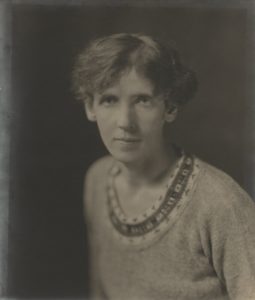
Rose Macaulay, novelist, poet, journalist, and essayist, began contributing to Time and Tide from its fifth issue in 1920, and was still writing for the magazine in 1951. During Time and Tide’s early years, she mainly reviewed fiction, but for an extended period after the Second World War she was its trenchant and enthusiastic radio reviewer.
Macaulay was born on 1 August 1881 to Grace and George, a schoolteacher who would go on to lecture in English literature at Aberystwyth and Cambridge Universities. For seven years of her childhood her family lived in Italy, where she was educated by her parents. Following their return to England, she attended Oxford High School and then Somerville College where, in 1903, she was awarded an aegrotat degree in history. After leaving Oxford, she returned to her family’s home, now in Aberystwyth, where she began writing and publishing poetry and, later, novels: work that gave her an intellectual escape from domesticity, and from her mother’s opinions about how young women at home should conduct their lives. In 1912 her sixth novel, The Lee Shore, won a Hodder & Stoughton literary prize of £600 (equivalent to nearly £50,000 today), which finally gave her financial independence. The following year she moved to London where, from her flat off Chancery Lane, she began to move in literary circles. The literary salons she co-hosted with Naomi Royde-Smith (novelist, newspaper editor, and fellow Time and Tide contributor) attracted numerous writers after the First World War.
Macaulay was, joyously, a professional woman of letters. Besides Time and Tide, she wrote for periodicals including Good Housekeeping, The Spectator, Nash’s and Pall Mall Magazine, the London Mercury, the Quiver, Harper’s Monthly Magazine, the Saturday Review, the Daily Mail, and the New Statesman and Nation. Between 1919 and 1939, she published 22 books, half of which were novels; the others include two anthologies of English literature, scholarly studies of John Milton and E. M. Forster, and two collections of her own essays and journalism. She occupied a fluid position in the literary marketplace, writing for money and writing what she found interesting, her work straddling both high and middlebrow spheres. Her caustic essays ‘Problems of a writer’s life’ (1923) and ‘Problems of a journalist’s life’ (1925) show how she resisted gender categorisation, and instead created her own persona, with which she could operate independently with integrity. In 1927 she became a radio personality, contributing stories and talks, and appearing on panels.
Macaulay began reviewing for Time and Tide in June 1920, at a moment when her own literary celebrity was at a peak. One of her best-known novels, Potterism, had just become a bestseller, and she was much sought after by newspaper and journal editors, eager to capitalise on the popularity of her name. Satirising what nowadays we would call the tabloid press and charting attempts by a female writer to break into a literary world that is largely dominated by men, the novel engages with two of Time and Tide’s core interests. Macaulay’s first contribution to the journal was a review of the latest novel by future Time and Tide contributor (later, director) E. M. Delafield; in total, she contributed 31 articles between June 1920 and August 1922, when she was succeeded as the magazine’s fiction reviewer by Sylvia Lynd. She remained an active contributor however, via letters defending middlebrow culture and articles in the journal’s weekly ‘Notes on the Way’ opinion column. Following the Second World War, she contributed monthly reviews of radio talks to Time and Tide.
In 1958, Macaulay was made a Dame for services to literature. She died on 30 October 1958, aged 77.
By Dr Kate Macdonald and Dr Eleanor Reed. Kate is Director of Handheld Press, a UK-based publisher selling wonderful and remarkable stories from the past and present. The Handheld Press 2020 edition of Potterism is available here.
Sources:
Clay, Catherine. Time and Tide: The Feminist and Cultural Politics of a Modern Magazine. Edinburgh University Press, Ltd, 2019 (2018)
Sarah LeFanu, Rose Macaulay (Virago Press, 2003)
Sarah Lonsdale, ‘Introduction’ to Potterism (Handheld Press, 2020)
Kate Macdonald (ed.) Rose Macaulay, Gender and Genre (Routledge, 2018)
https://www.oxforddnb.com/view/10.1093/ref:odnb/9780198614128.001.0001/odnb-9780198614128-e-34668